Relive all the action in our live blog from the national Q community event on Thursday 23 November held at Aintree Racecourse, Liverpool.
Wednesday 22 November
4.00pm Welcome to the Q event live blog and details of the day. Tomorrow the Health Foundation, supported by NHS Improvement and others, are bringing together nearly 400 Q members and colleagues together for a UK-wide Q community event. I’ll be live blogging throughout the day – keeping you up to date with the conversations, sharing the knowledge being surfaced and creating a record of the day.
This full day event is being led by Q together with the Innovation Agency and others including Haelo, AQuA, Greater Manchester Academic Health Science Network, NHS North West Leadership Academy and North West Employers.
You can find out more about the Q community on our website.
Thursday 23 November

8:30am Good morning and welcome to the live blog for the national Q community event on Thursday 23 November held at Aintree Racecourse, Liverpool. We have a packed agenda to share with you today, and we’ll make sure we capture all the inspiring content and activities to enable members to connect, learn and showcase. We are focusing the day around 3 pillars: Think, Do, Act.
.@PennyPereira1 shares what she is looking forward to at today's #Qcommunity #Qevent2017 pic.twitter.com/lrhgX5R6ky
— The Q community (@theQCommunity) November 23, 2017
In Liverpool today for national @theQCommunity event
Presenting work on #QIin4Objects as a #PechaKucha
Read more here: https://t.co/rLjYEQfkqv
Up early for ferry across the Mersey first⛴#Qevent2017 pic.twitter.com/wVXghhjyoC— Dr Graham Mackenzie🇪🇺 (@gmacscotland) November 23, 2017
Getting some funny looks as I run through my PechaKucha presentation – again – on train but looking forward to doing it for real! @theQCommunity @HealthFdn #Qevent2017
— Helen Crisp (@HelenMCrisp) November 23, 2017
9:45am Registration is filling up as we prepare to open.
#Qevent2017 registration from The Health Foundation on Vimeo.
Cynergy are our event managers today, they’ll be in the purple jackets if you have any questions.
This morning, we’re hosting live Randomised Coffee Trials (RCTs) with the Q community. RCT works like this – every member who signs up will be sent the name of another randomly-chosen member every month. Each pair can arrange a brief informal meet-up at a time that suits both parties, digitally, over the phone or in person. Today we have some live and bustling RCT’s! If you’ve not already signed up, what are you waiting for?
Over in exhibition space, at the Health Foundation stand, a twitter huddle kicks off. Our Marketing and Communications Manager, Fran Kirk will be tweeting throughout the day, if you want to join the conversation today make sure to follow @theQcommunity and use the #Qevent2017
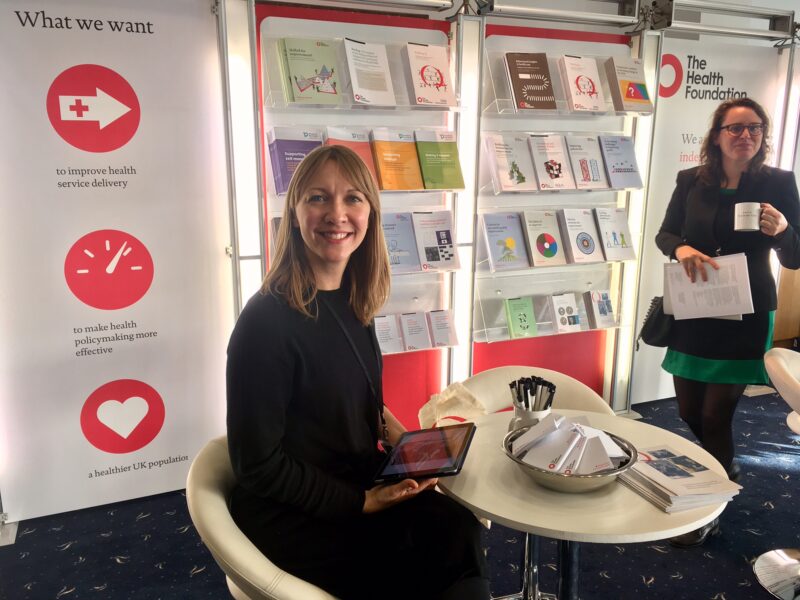
#Qevent2017 @Qcommunity Liverpool event room full of Quality improvement Q members great sense of energy in the room
— Elizabeth Angier (@elizabethangier) November 23, 2017
Great connections made already at #Qevent2017 lots of great work going on across the UK. Proud to be a part of it @nhsNETS @TEWVQIS @theQCommunity
— NETSQI (@NETSQI) November 23, 2017
10:30am Stacey Lally, Head of Delivery, opens the Q event by welcoming delegates to the event. Stacey recalls that “it was in a room not far from here where we thought about what the design of this event would look like today, when someone said ‘it’s your community, your knowledge, your event’ and it’s that spirit that has designed and supported the delivery of this event today.”
We encourage members to be present as we embark on six and a half hours of knowledge and learning ahead of us, with the most of the day split into break out sessions.
We have 400 people here today, so let’s talk about you! Whether traveled train, plane or by car, we have a wonderful diverse group of people with us both geographically and professionally. We would also like to extend a special welcome to Andy Philips from Hawkes Bay, New Zealand.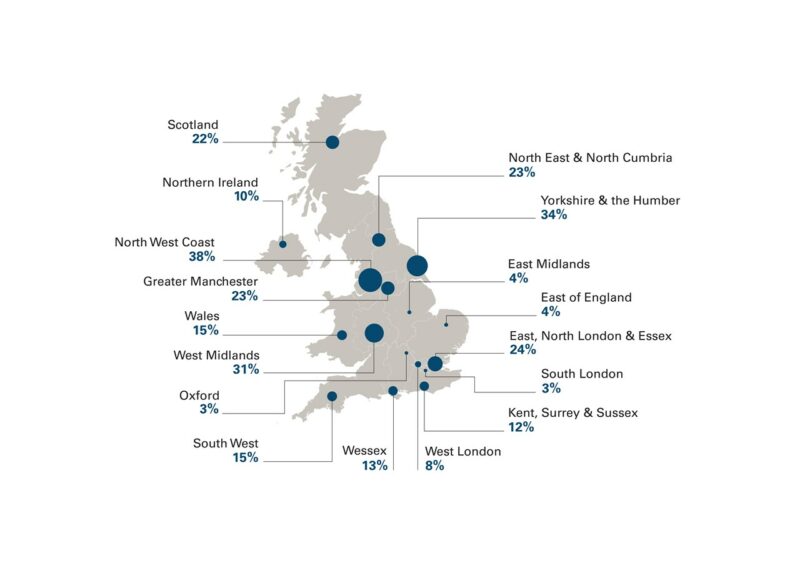
What a pleasure to be @theQCommunity event today. I’ve already bumped in to lots of familiar faces and had some interesting conversations with some new connections too #Qevent2017 pic.twitter.com/L0xwVVR6oA
— Abigail Harrison (@Abigail_NHS) November 23, 2017
10:40am Penny Pereira, Deputy Director of Improvement at the Health Foundation and the Programme Director of the Q initiative is next to take the stage, introducing the power concept.
Here we go with 400 Q people, the movement keeps growing and influencing and Penny is talking POWER @gsqia @theQCommunity #Qevent2017
— Andrew Seaton 💙 (@seaty63) November 23, 2017
Penny Pereira talks about Q as an idea developed with 231 founding members during 2015. Learning from the co-design process for a large scale improvement community is available via the Health Foundation website. Over the last year there has been 1921 more people join Q.
Q is the idea that we should seek a more joined up approach to improvement across the UK.
Penny continues: “It’s the idea that if we pool our talents and energy and spend less time reinventing wheels; if we challenge ourselves and each other to collaborate in new ways, and think at every turn how we can involve and pass on what we’re learning to those beyond Q, then improvement can have a bigger impact.” And if we want to, the power is with us to take it much further!
The transition to greater impact is through contribution to collective effort – we all have an individual part to play within systems @PennyPereira1 @theQCommunity @HealthFdn #theQcommunity #Qevent2017 pic.twitter.com/wQVhZjRj2C
— Mirek Skrypak (@MirekQI) November 23, 2017
Penny is then delighted to introduce to the stage her colleague Will Warburton, Director of Improvement at the Health Foundation, someone who “not only brought out the talent and potential I never knew I had, but brings empowering leadership and deep thought to every conversation.”
Will digs deep into the concept of being powerful alone but more powerful together, effecting change through collaboration.
Talking about his preparation for his keynote address, Will watched the eight interview series produced by Peter Wilcock, Helen Bevan and others as part of English NHS’s Developing People, Improvement Care Strategy and learning from our improvement heritage. “Of all the riches in those interviews… the message I heard in each and every one was that…
none of us, however brilliant, can make change in health and care happen alone.
“None of us, however brilliant, has enough knowledge or power to make change happen alone”. A powerful and personal address from @willwarburtonHF empowering us all, and helping us believe we can enable change together #qevent2017 pic.twitter.com/6d6ov5geoz
— Tracy Webb (@TracyWebb007) November 23, 2017
Realising the power of human connection through collaboration; integral to the ‘doing’ #Qevent2017 @kscopehealth
— Kate Cheema (@katycheema) November 23, 2017
Will continues: “By being here today, I am being bold to assume you have to agree with Penny, that Q is a powerful tool. It could be even more powerful than we imagine.”
Communities and networks have shaped the word before, and they will continue to do so.
'Conversations are like water over rock' – shaping change. As a patient/carer trying to change rigid systems, nuggets of wisdom like this keep me going #Qevent2017
— Mandy Rudczenko (@MandyZenko) November 23, 2017
Great opening to today’s event! #qcommunity #qevent2017 https://t.co/3NL2qvSbNe
— Natasha Scott (@natashascott_ID) November 23, 2017
11:00am Penny is back to the stage as it’s time for the ice breaker! Delegates are asked to select an artifact on their tables that inspires or represents power in their improvement work.
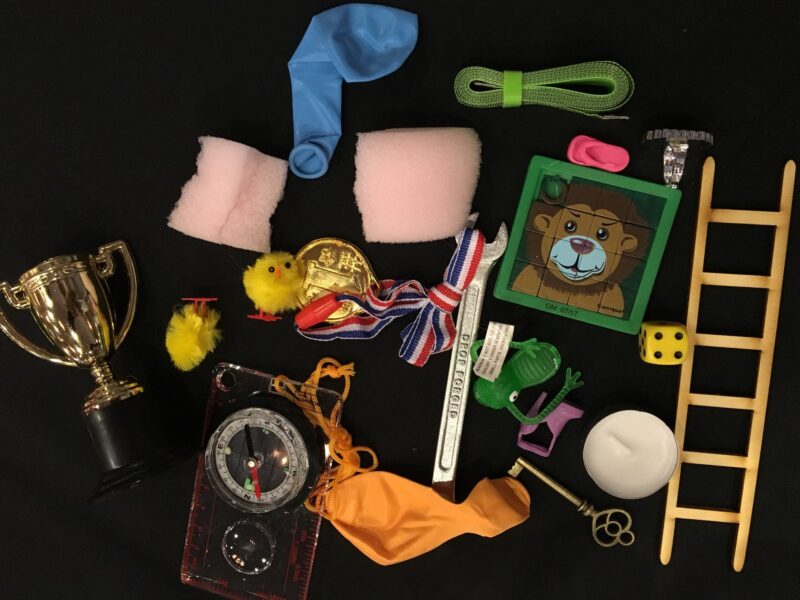
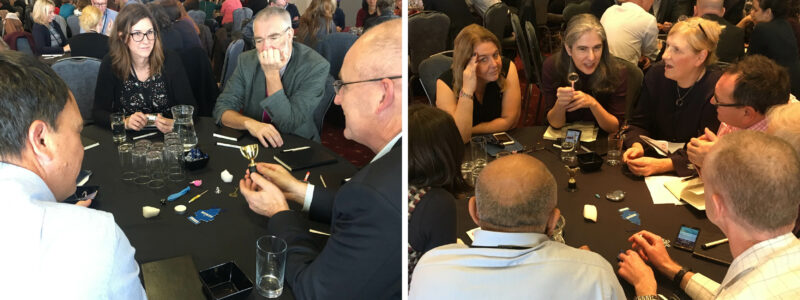
We were asked what gives you power in your improvement work? I chose the measuring tape – Measurement for improvement to highlight variation and hopefully facilitate QI @HQIP @theQCommunity @HealthFdn #theQcommunity #Qevent2017 pic.twitter.com/pcbb3pj09E
— Mirek Skrypak (@MirekQI) November 23, 2017
11:15am – 12:25pm Morning sessions
This takes us to the first collection of break out sessions. We begin in Future Q, continuing with Penny Pereira.
Members are sharing what’s important to them about Q and their dreams for #Qcommunity in 2022. What would you say? #Qevent2017 @PennyPereira1 pic.twitter.com/fAHnT7IuiE
— The Q community (@theQCommunity) November 23, 2017
In the fast paced Future Q session, members are helping to shape the plans for Q for the long term. This is a high-level overview of what’s proposed for Q in future. You can listen to a recording of a from a WebEX earlier in the year for more information. The PowerPoint slides for this session are available to download.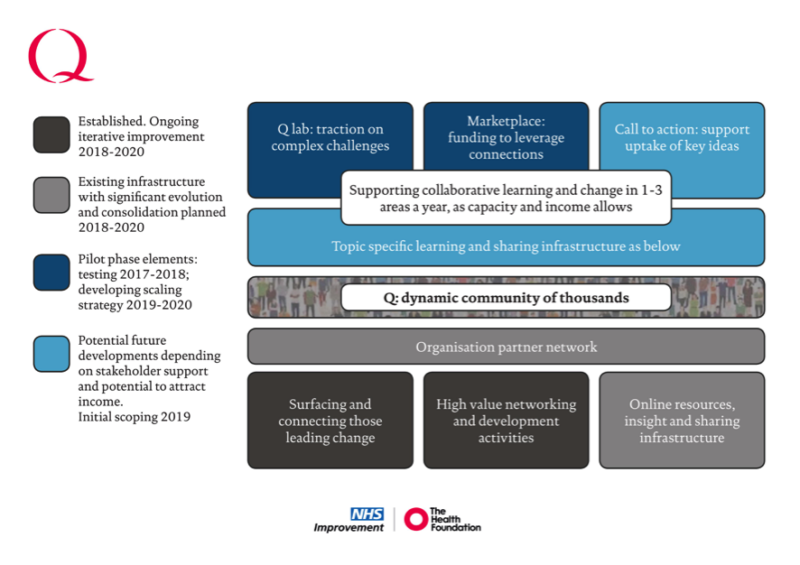
What matters to members about Q #Qevent2017 @theQCommunity pic.twitter.com/V5E9hgUXkO
— Stacey Lally (@stacey_lally) November 23, 2017
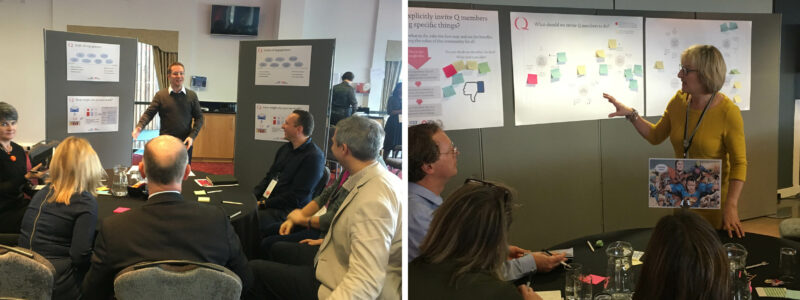
In break-out B, Supporting local system-wide learning and transformation with Stephen Singleton, Lead for Cumbria Learning and Improvement Collaborative; Daniel Weiland, Consultant Medical Microbiologist and Helen Liggett, Regional Service Improvement Lead.
In ‘supporting local system wide transformation’ session @drsingletonsay @send2dan and Helen Liggett ask “how can Q support system change?” #Qevent2017 pic.twitter.com/ud8FnZW6iD
— The Q community (@theQCommunity) November 23, 2017
In this break-out session, speakers are looking at supporting local system-wide learning and transformation. Systems can be defined in different ways – health care can be thought of as a ‘system of systems’. Delegates are considering different perspectives on systems, from micro level within a team context, organisation level to national level. Slides for this session are available here.
Stephen talks about the Transformation Model used by Cumbria Learning and Improvement Collaborative, adapted from NETS.
Familiar challenges – Helen Liggett sharing experience from 100k genomes projects #Qevent2017 pic.twitter.com/5C6yrPwzI1
— Cecily Hollingworth 💙 (@CecilyHoll) November 23, 2017
Also in our morning sessions, we catch Building an improvement culture with Suzie Bailey, Director of Leadership and Quality Improvement, NHS Improvement; Jocelyn Cornwell, Chief Executive Officer, Point of Care Foundation and Matt Hill, Consultant Anesthetist at Plymouth Hospitals NHS Trust and Regional Patient Safety Lead at South West AHSN.
Every interaction of every leader at every level shapes organisational culture
Be the leader you wish you had.https://t.co/1NnPDvbyOV#Qevent2017 @bailey_suzie pic.twitter.com/AeUUHOawWI
— Hesham 🧩 (@hesham_abdalla) November 23, 2017
Jocelyn Cornwell, Chief Executive of Point of Care Foundation, talks about the importance of normalizing difficult feelings. Healthcare settings can be lonely places and fears of incompetence, anger, fear, grief and shame are commonly expressed. Sharing emotions allows staff to feel less isolated, reducing the sense of difference.
.@JocelynCornwell speaks about the evidence of impact on wellbeing if we bring staff together to share their experiences of caring. Similar to #VBRP. Better evidenced?#schwartzrounds #Qevent2017 pic.twitter.com/nWLeZ58icz
— Dan Harley (@DanHarley3) November 23, 2017
We’re also hosting a popular Embedding evaluation in your improvement work, session with Martin Marshall, Programme Director for Primary Care, UCLPartners; Emma Gibbard,
Research Impact Manager, University of Bath and Helen Seers, Research & Evaluation Lead, Penny Brohn UK and Vising Research Fellow, University of West of England. Access the slides here.
Emma gives an overview of evaluation and it’s importance in improvement outlining many types and multiple approaches to evaluation – don’t miss her top tips:
- 1. Engage and involve stakeholders
- 2. Understand the purpose, set clear aims and objectives
- 3. Identify what information you need
- 4. Share your findings and act on them
Ask yourself… can you afford not to do a proper evaluation?
Doing a proper evaluation is a must. But with all our competing demands how can we embed evaluation in practice? @seers_helen shares her experience of embedding evaluation @theQCommunity #Qevent2017 pic.twitter.com/kl3Pfpp29d
— Natalie Creary (she/her) (@NatalieCreary) November 23, 2017
Delegates explore participatory research and the in residence model – the democratisation of knowledge – with Professor Marshall.
"No research without action, no action without research" Embedding research and evaluation into your improvement work #QCommunity #Qevent2017 pic.twitter.com/Joyh4i62HF
— Rosie Redstone (@RosieRedstone) November 23, 2017
Participatory evaluation = democratised power to deliver real change and new body of knowledge. Evaluation in the social age perhaps #Qevent2017 @theQCommunity
— NHS North West Leadership Academy (@nhsnwla) November 23, 2017
We are creating an #evaluation #snowstorm in our breakout session #Qevent2017 @theQCommunity @MarshallProf @seers_helen @em_gibbard pic.twitter.com/QRWqb3m4nK
— Natalie Creary (she/her) (@NatalieCreary) November 23, 2017
In the last of the five morning sessions, Coaching and coaching others with Hannah Dickinson from React
30 delegates are taking part in a fantastic immersive theatre experience with the team from React, where the audience direct the actors to navigate a scenario.
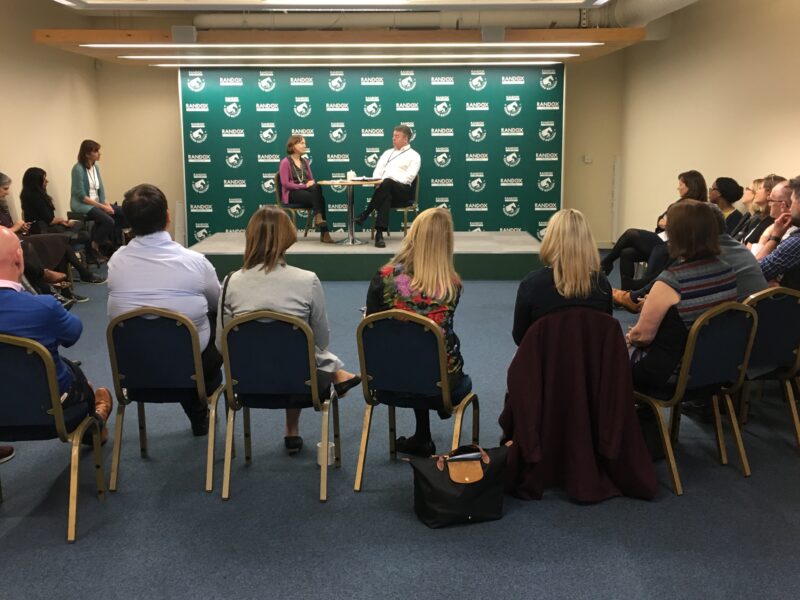 The situation is a Cystic Fibrosis Clinical Nurse Specialist, Claire, who is a champion for patient centred care. She wants to help parents of children with CF to be part of shared decision making in the treatment and care of their children and to be able to do more treatments themselves at home. Claire needs to figure out the logistics of how this could work, how she can gain support for the idea and how she can influence the senior consultant to get her on board. The 30 delegates in the room are the directors of this scenario.
The situation is a Cystic Fibrosis Clinical Nurse Specialist, Claire, who is a champion for patient centred care. She wants to help parents of children with CF to be part of shared decision making in the treatment and care of their children and to be able to do more treatments themselves at home. Claire needs to figure out the logistics of how this could work, how she can gain support for the idea and how she can influence the senior consultant to get her on board. The 30 delegates in the room are the directors of this scenario.
#Qevent2017 @theQCommunity coaching session learning to listen sometimes after a good question there is a pause hold that silence even though it feels uncomfortable pic.twitter.com/pcVhT0OKvK
— Elizabeth Angier (@elizabethangier) November 23, 2017
12:25pm Lunch We’ll be back soon!
Some of our Special Interest Groups (SIGs) are taking the opportunity to meet face to face over lunch. What is a SIG and how can I get involved? See the SIGs page for more detail and read about our exciting new groups.
During lunch we caught up with community members to find out about their experience so far. Here’s Abigail Harrison, Director of Innovation at Haelo, Amit Bali, Pediatrician based in London and Kate Cheema, Head of Patient Safety Measurement Unit, South Central and West CSU.
#Qevent2017 reviews from The Health Foundation on Vimeo.
1:23pm – 3:25pm Welcome to our afternoon sessions.
We’re excited to be hosting two PechaKucha with Tony Kelly, National Clinical Director Maternal & Neonatal Health Safety Collaborative and also in a second room with Helen Bevan, Chief Transformational Officer, Horizons Group, NHS England.
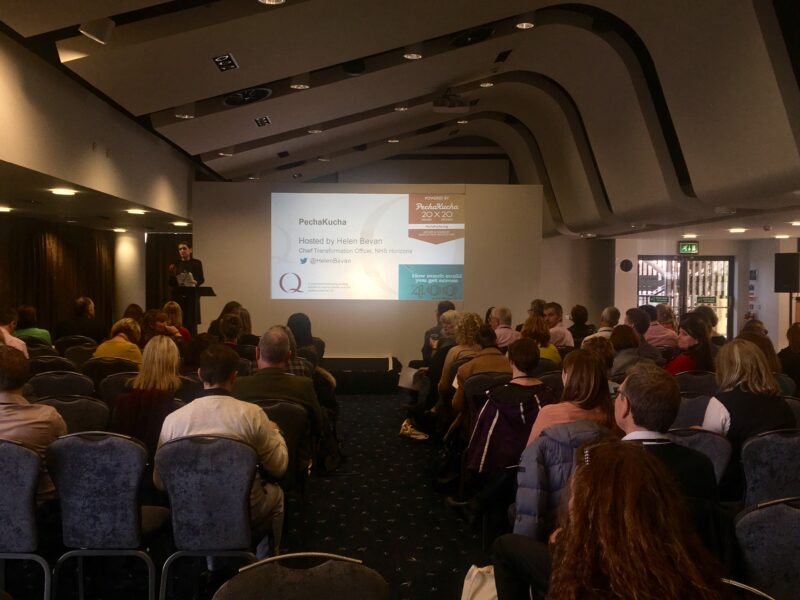
PechaKucha is a great way to learn about someone’s passion and motivation for QI in 6 mins and 40 secs #Qevent2017 #mighttryittoo @helenbevan
— SPSP Medicines (@SPSPMedicines) November 23, 2017
Members have spent time over the past month working on their PechaKucha presentation, of a variety of styles. PechaKucha is a rapid fire and high energy presentation style using 20 slides with images only and shown for 20 seconds each and timed – takes practice and skill to deliver this 6 minute and 40 second presentation. Wishing Q members luck in their presentations!
We caught up with one of our presenters preparing for the session, Andrew McCracken, Head of Communications at National Voices.
Preparing for Pecha Kucha at #Qevent2017 from The Health Foundation on Vimeo.
Literally translated as ‘chit chat’, Helen says “the perfect thing to do after lunch. The presentations are so fresh, fun and visual.”
You can find out more about the informative, inspiring and truly fantastic range of quality presentations by using the #Qevent2017
Super to see Jedi Knight @pharmsafe @theQCommunity #QEvent2017 @CCNetworkcom may the force be with you 😁 pic.twitter.com/n93QSrWZg6
— 🌻Angela Green (she/her) 🌻 (@burnettabear) November 23, 2017
@craigwhitephd and I getting ready before our pecha kucha talks… think we did all right! #Qevent2017 #Qcommunity pic.twitter.com/BkQHLb3zn8
— Dr Joy Furnival CEng MIET 🐝 (@joyfurnival) November 23, 2017
Pechakucha talks are the way forward 20 secx20 slides. Amazing creative talks by all #QEvent2017 @helenbevan @PS_Oxford
— Katie Lean (@katielean2) November 23, 2017
#Qevent2017 loving the pechakucha sessions in @theQCommunity – 20 slides of 20 seconds really works – I’m converted! pic.twitter.com/lE7kyOjgAm
— Chris Collison (@chris_collison) November 23, 2017
Fabulous PechaKucha session at today’s #QEvent2017 – some incredible stories and top presentation skills from all!
— Sophie Bulmer (@SophieBee) November 23, 2017
We caught up Specialty Trainee in general surgery, Grampian Trainee Lead and Scottish Clinical Leadership Fellow, Joy Ngai following her presentation: Why trainee doctors may be the missing part in your organisation’s improvement effort?
#Qevent2017 Post Pecha Kucha from The Health Foundation on Vimeo.
Also this afternoon half of the delegates are taking part in OpenSpace – something always very popular with the Q community, with Stacey Lally and Dominique Allwood, Assistant Director Improvement, the Health Foundation.
@theQCommunity #Qevent2017 #openspace how to help the QI garden grow are you a 🌞🐝🦋#marketplace @Levette22 @BouterBoulter pic.twitter.com/SZOljsV77D
— Nichola Cullen (@Boyosmama) November 23, 2017
Are you a bumble bee and buzzing between convened groups cross fertilising. Or perhaps a butterfly lounging around public areas looking beautiful and chatting sociably to anyone who cares to join them. The organic gardeners tend their chosen bed, allowing nature to take its course – then display the produce at the Village Fete. Lounge around public areas looking beautiful and chatting sociably to anyone who cares to join them. The soil may not be as colourful as the bumble bees or butterflies, but they are vital to growth.
Setting up our Open Space discussions with @stacey_lally #Qevent2017 @theQCommunity pic.twitter.com/HHTlbuy4bG
— Usha Boolaky (@UBoolaky) November 23, 2017
Buzzing bees at Open Space #Qevent2017 @theQCommunity pic.twitter.com/e9AT0cEfov
— Stacey Lally (@stacey_lally) November 23, 2017
3.25pm – 3.40pm Time for coffee!
3.40pm – 4.40pm Afternoon break-out sessions
We’re beginning in Q Lab and peer support break out session with Tracy Webb Head of Q Lab, the Health Foundation and Libby Keck, Programme Manager Q, the Health Foundation
The Q Lab is bringing people together from across the UK to work and make progress on complex challenges facing health and care. The Health Foundation are piloting the Lab process this year while looking at the challenge: “what would it take for peer support to be available to all who would benefit from it?” The slides for this session are available to download.
We’ve been working with @NHSHorizons and @theQCommunity members to develop Q’s theory of learning. @KathrynPerera , @PennyPereira1 & @andy1Crawford present at #Qevent2017 – more info via https://t.co/Hjv60Qsfud communities/
— The Q community (@theQCommunity) November 23, 2017
The Lab team use some Creative Approaches to Problem Solving techniques to look at a problem differently. Some of these techniques were used the 2015 co-design of Q.
Delegates were deep in conversation benefiting from the peer support session, whether new to the lab, already involved or planning for the future.
Popping into the next break out session we find How do we learn? with Kathryn Perera, Head of Transformation, NHS Horizons Group and Andy Crawford, Head of Clinical Governance in NHS Greater Glasgow and Clyde
Taking time out to think about what supports learning environments #Qevent2017 pic.twitter.com/tQl0GHhvmD
— Professor Craig White 🏳️🌈🏴🇮🇪 (@craigwhitephd) November 23, 2017
Explicit knowledge and structured training is best understood as embedded in a process of continual learning and improvement on the job. Kathryn Perera and Andy Crawford are reflecting on the different learning theories and practical ways to apply them in our improvement work. Slides from this session are available to download. You can find out more about learning in communities in this report.
.@KathrynPerera on how we learn at @theQCommunity #QEvent2017
After centuries of fixed approaches our understanding of the psychology of learning is accelerating
Read more here:https://t.co/duYNfuC95x#Qualityimprovement #LearningTheory pic.twitter.com/DfmETjVsJs— Dr Graham Mackenzie🇪🇺 (@gmacscotland) November 23, 2017
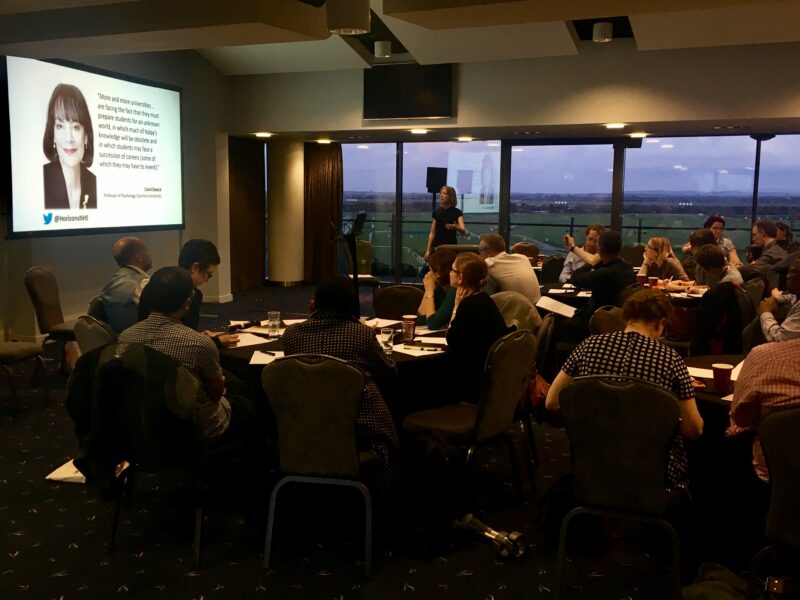 Kathryn led a captivating presentation, exploring connections and new vs old power.
Kathryn led a captivating presentation, exploring connections and new vs old power.
@KathrynPerera is talking about how the way we learn is changing #Qcommunity #Qevent2017 @horizonsnhs pic.twitter.com/Y3SJEachn3
— Zoë Lord (@ZoeLord1) November 23, 2017
Improvement is messy complex work: value tacit knowledge and practical wisdom in the learning strategies we use #Qevent2017 pic.twitter.com/3O9SlTy6OW
— Penny Pereira (@PennyPereira1) November 23, 2017
And in our final break out session, QI across patient journeys and pathways with David Fillingham, Chief Executive, AQuA and Katie Clarke-Day, Patient Leader, Not Just a Headache.
Much improvement is done along clinical or single disease pathways or within single organisations, which rarely match patient journeys. Thinking about improvement and flow through the lens of the patient journey and what they experience is still relatively rare. Q member Katie Clarke-Day talks about patient pathways and that they are unique and multiple and attempts to over simplify can be detrimental. Access the slides here.
Powerful message from @notjustaheadach about improving patients journeys through services. 'I have a life too' #Qevent2017
— Joanna Bircher (@joannabircherQI) November 23, 2017
David Fillingham talks about flow, the movement of patients, staff, information and resources between departments and organisations along a pathway of care. Thinking about how we use assets and resources to improve pathways.
More detail about the challenge and potential of whole system flow is available via a recent Whole System Flow publication by David, Penny Pereira and Bryan Jones.
Talking about ‘system flow’ @theQCommunity #Qevent2017 so recommend talking to NW Utilisation Management team @smcgirr31
— Christine Morgan (@Chris5anne) November 23, 2017
4.40pm – 5:00pm Close
#Qevent2017 @theQCommunity @PennyPereira1 does the wrap up after a brilliant day of sharing. pic.twitter.com/SGL2MPPcmo
— Jonathan Broad (@JonoBroad) November 23, 2017
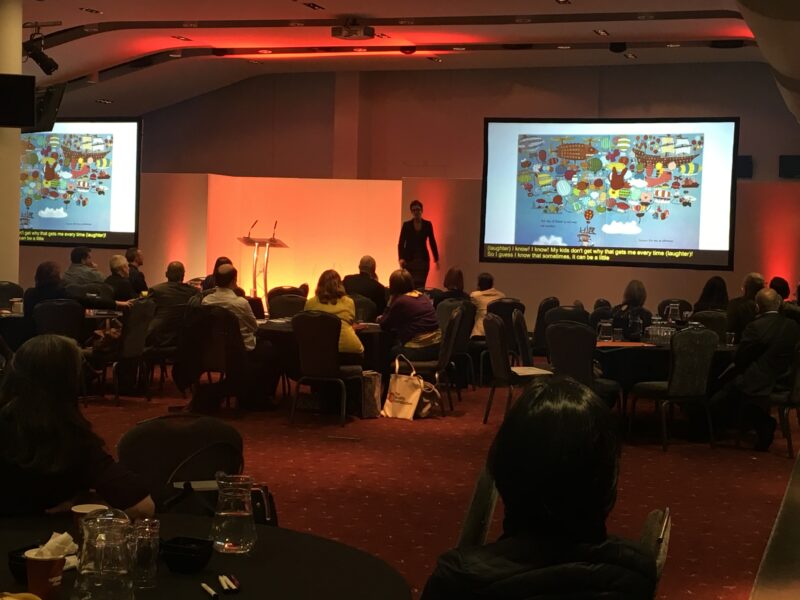
In closing remarks, Penny thanks our fantastic speakers, valued support from partners and over 80 Q members who have helped in designing and delivering today, being so generous with their skills and expertise.
Who can you spot in this group of Q Community members who’ve made today possible ? #QEvent2017 pic.twitter.com/JH3nTk4k9H
— Professor Craig White 🏳️🌈🏴🇮🇪 (@craigwhitephd) November 23, 2017
It’s been a pretty packed day with a lot of ideas, debate and interaction. Please do share this blog with any members who missed today, there will also be a special edition of Q-municate next week.
We started the day with the bold idea of power, and we’ll end in a lighter yet similar way.
The event is closed with an entertaining children’s story of the Hundred Decker Bus by Mike Smith and linking to the resourcefulness, creativity and power of connection in the room, and the wider community, and the new friends and sources of power we’ll be able to turn to when we get stuck.
@PennyPereira1 is closing today’s event with a story about the Hundred Decker Bus, which is all about the power of the collective and how together they overcome the challenges they face. #Qevent2017 pic.twitter.com/TJvXgIEiGI
— The Q community (@theQCommunity) November 23, 2017
https://twitter.com/1McGuinness/status/933742485033181185
We hope you’ve drawn energy from the ideas and connections you’ve made today.
We’ve created something special – it can be daunting at times – but we must celebrate what we have achieved together!
That’s a wrap! A huge thank you once again to our members, organisers, speakers and partners. Safe journey home!
Started the day with an icebreaker item that holds power for us in QI… It has certainly been a day of celebrating creativity and success 🎉
Loved taking part… What a community to be part of @theQCommunity #Qevent2017 pic.twitter.com/CYw8SxGXlO— Joy Ngai (@joyngai_) November 23, 2017
https://twitter.com/Jen_Ellis_/status/933737969248342018
https://twitter.com/Gill_Improver/status/933783570669297664
That’s a wrap! from The Health Foundation on Vimeo.
Had a fantatric day at #Qevent2017 thankyou to all involved , especially the brave pechakucha presenters.. brilliant!
— sarahfiori (@sarahfiori76) November 23, 2017
So very impressed with #QEvent2017 today! I know it’s a cliche, but really v energised to get cracking and get more involved. Met some FAB people #NewQ @theQCommunity pic.twitter.com/Bs41LQ3hgf
— Laura Hailes (@_hailes) November 23, 2017
Had an absolutely brilliant day 2day at #Qevent2017
Loads of conversation, learning & sharing ideas & connecting with friends @theQCommunity— Lisa Elliott (@lisaelliott01) November 23, 2017
Great #Qevent2017 – feeling energised & well connected – so much talent in one building, well done @theQCommunity @HealthFdn pic.twitter.com/eyAAxAspfU
— Juliette Kumar (@JulietteKumar) November 23, 2017
Such a great day today at @theQCommunity #QEvent2017 Fantastic catching up with old friends and meeting new ones!
— Julia Wood (@JuliaWoodQI) November 23, 2017
Comments
Chris Collison 24 Nov 2017
What an excellent live-blog - thanks for putting this together. Now I know how much I missed, and I was *there*!
Matthew Mezey 24 Nov 2017
Yes, I'd echo Chris: I love your fabulous work pulling this live-blog together.
What a great day! :-)
I hope you had some fun too, and didn't find yourself wholly tied to your keyboard.
Amanda Miskell 28 Nov 2017
Fantastic day ! Thank you for the opportunity to network, listen to some fascinating presentations, and take QI to a whole new level - Brilliant.
Need to keep the MH SIG going too # Lisa Knight :-)
Matthew Mezey 28 Nov 2017
Hi Amanda,
Yes, fantastic wasn't it.
And Lisa Knight did make a valiant attempt to meet up with some of the 60 'QI in Mental Health' SIG members - but the layout made it very tricky.
She did manage to have some individual conversations with members of the SIG.
If anyone (Q members, or others) would like to join that SIG, Lisa's contact is on the SIGs listing page: https://q.health.org.uk/get-involved/special-interest-groups/